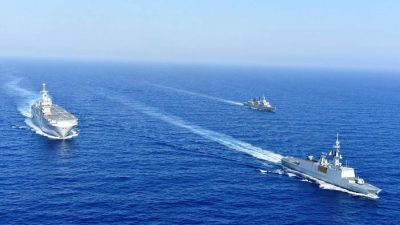Power Rivalry in the East Mediterranean Continues Despite COVID-19 Pandemic

The summer of 2020 will certainly be remembered for many events, and most of them unrelated to the 21st century’s first pandemic. In the East Mediterranean, four key events stand out among others this summer – tensions and hostilities between NATO members Greece and Turkey; the peace agreement between Israel and the United Arab Emirates; the devastating Beirut Port explosion; and, renewed attacks and reprisals between Israel and the Islamist forces active in the Gaza Strip. Of these though, the most immediate issue is the current hostility between Greece and Turkey, especially since it was revealed only yesterday in Germany’s Die Welt that Turkish President Recep Tayyip Erdoğan ordered for a Greek ship or fighter jet be destroyed. The order, according to Die Welt, was refused by his generals.
With these emerging issues over the summer, global and regional powers are using geopolitical manoeuvring to advance their spheres of influence. This has brought the East Mediterranean to the forefront of many state interests, especially those seeking to expand their power, particularly France, Germany and Turkey.
The dispute between Greece and Turkey is clearly territorial and energy related, with the latter desperately seeking cheap energy sources for its large population of nearly 85 million. The movements that Germany developed in the East Mediterranean aims to structure a wider national sphere of influence, both to stabilize the southern peripheries of Europe and to limit French attempts to regain and strengthen its influence in the region. By offering the Hamburg frigate to the “Irini” European naval operation to enforce an arms embargo on Libya, Berlin fielded a military asset which will not upset the equilibrium of the Mediterranean Basin, but will probably change Irini’s mission to be much less hostile towards Turkey that is arming and backing jihadists belonging to the Muslim Brotherhood Government of National Accords based in the Libyan capital of Tripoli.
Germany has also tried to involve itself in the current Greco-Turkish hostilities in the East Mediterranean by attempting to translate the strength of its political and economic dominance over the two countries to force them to negotiate. However, this has been without any success as Turkey continues to act unilaterally and make threats of war against Greece. The Germans are effectively attempting to compete with the French in the region. Paris resolutely sides with Athens while Germany is unwilling to relinquish its centuries’ long alliance with the Turks.
The US is close to a presidential election and the last thing that President Donald Trump wants is to present his constituents with a new war thousands of miles away from home. France, Germany and Turkey, all involved in the East Mediterranean at the moment, have understood this. It is entirely plausible that Germany is somehow trying to replace the US in a very large area, ranging from the Mediterranean to the borders of Russia, using the European Union to achieve this. The convergence of a conflict in the Aegean and Germany’s involvement should be seen as competitive, and not complementary to American moral suasion. These ambitions were clearly perceived in the Oval Office and probably contributed to the US’ decision to lighten the American military presence in Germany. In Washington, no one wants the consolidation of German supremacy in Europe. Formally allied countries are behaving more frequently as competitors, if not outright rivals. It is happening between Greece and Turkey, as well as between France and Germany, and Germany and the US.
The world has not become more violent or volatile, but rather the forces that shape it and the structure of international relations have changed. The decline of exclusive US power has seen the rise of a multipolar world order, with not only the rise of great global powers like China, but also regional powers that are willing to engage in realpolitik to expand their sphere of influence, like Turkey. The decline of US unipolarity has freed up space to be exploited by Middle Powers.
France and Turkey have shown no particular hesitation in using all tools at their disposal to advance their agenda, including the military. Germany has also attempted to appear in the Mediterranean, a circumstance that seems to have awakened even Italy from its torpor, even if it remains extremely confused in its East Mediterranean policy as it attempts to appease the EU, as well as Turkey, to try and expand its influence into Libya. This has been too no effect. Many countries will find it increasingly difficult to claim absolute extraneousness to the logic of geopolitical competition, especially as the East Mediterranean becomes increasingly hostile. The truth is, as much as Germany attempts to become an influencer in the Mediterranean, especially in support of their Turkish allies, Berlin will not be able to break the French dominance in the region, as it is not a Mediterranean country, nor does it have a Mediterranean naval base. France has an entire Mediterranean coastline complemented with several bases and a massive fleet, and can therefore easily project its power in the region. Germany will not have this capability in the foreseeable future in the East Mediterranean. For this reason, Germany will not be able to break French dominance in the region.
*
Note to readers: please click the share buttons above or below. Forward this article to your email lists. Crosspost on your blog site, internet forums. etc.
This article was originally published on InfoBrics.
Paul Antonopoulos is an independent geopolitical analyst.
Featured image is from InfoBrics

